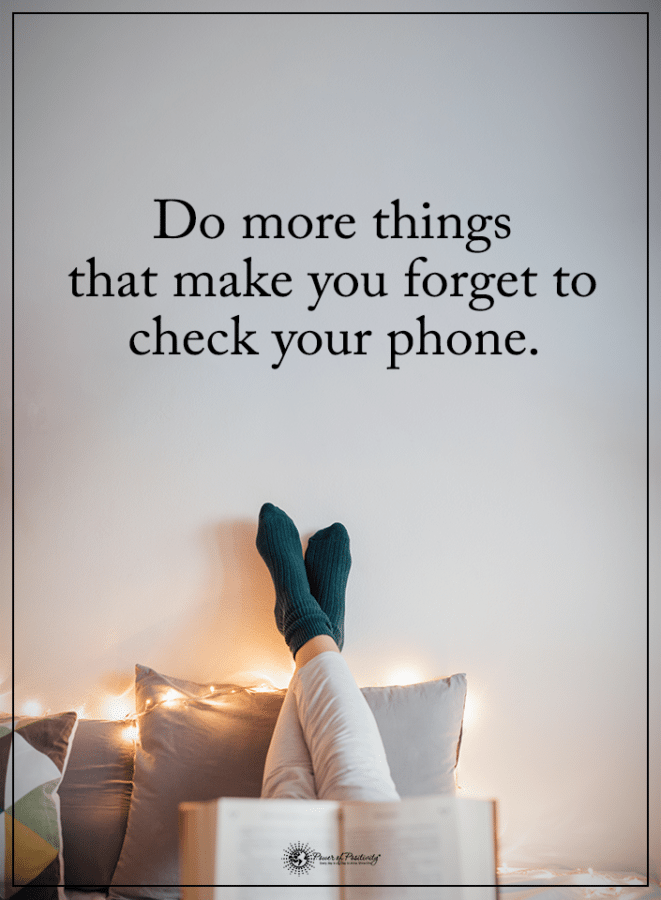Since smartphones hit the market and became affordable over the past few decades, people do everything with their cell phones. In fact, people rely on cell phones so much that they are at risk of having a cell phone addiction. This may sound ludicrous, but when you have one device that can take the place of every other device in your life (tv, computer, camera, flashlight, etc.), it’s not hard to become addicted to it.
Cell phones have made modern life much more convenient, but that convenience has come at a cost. Many people can’t seem to function without using a cell phone during a large part of their day. If you’re one of those people (or you know one), here are ten easy ways to break a cell phone addiction that you can try.
10 New habits help break your cell phone addiction
Try replacing your mobile device habit with these new behaviors.
1. Put the phone away.
“Out of sight, out of mind.”
You’ve probably heard this old saying before. This works wonders when you’re trying to get kids to focus on important tasks instead of toys and video games. It holds with cell phones as well.
If you put your cell phone out of sight and out of reach, you’ll be less likely to use it constantly. Of course, you’ll need to turn it off or turn it on vibrate, so you aren’t distracted by phone calls, messages, and other notifications.
By doing this, you are essentially removing the temptation from your life. That’s the best way to learn to operate without it. It will be hard at first, but the more you attempt to keep the phone away from you, the easier it will become.
2. Read books – real books.
The explosion of reading books on smart devices has been exponential. It’s so convenient to access any book in the world at the touch of a button. In fact, accessing a better variety and quality of information has enriched many people’s lives and increased the efficiency of education for many kids who don’t have access to modern books.
Unfortunately, the downside is that accessing books this way keeps you on your mobile device more, strengthening your cell phone addiction. There is also strong evidence in the research community that reading on mobile devices negatively affects a person’s learning abilities. Plus, studying on your mobile device makes it much too easy to swipe over to a game or social app where you’ll end up wasting time.
Until you can get your cell phone addiction under control, it may be wise to go old school and check out books from your local library.
3. Do activities that don’t include cell phone usage.
Reminding yourself that there is life outside of your cell phone is a great way to break the addiction. Try setting up activities with your friends or family members that require you to put your phone down. Sports, exercise, camping, fishing, baking, arts & crafts, and biking are all great examples of activities you can do that require both hands and your full attention.
When you participate in these types of activities, you’ll have so much fun that you won’t even think about your mobile device. Of course, if the device is constantly ringing in the middle of everything, this will be a distraction. It would be best if you put your phone on silent until you’re done.
4. Address any underlying concerns.
Some researchers suggest that a cause of cell phone addiction is that people suffer from some other underlying concern. Instead of solving the underlying concern, they compensate for it by constantly using their cell phone.
For example, someone may be concerned about keeping up with too many tasks on their hectic schedule, so they’re constantly checking their email, calendar, voicemail, and more. The real solution would be to prioritize their tasks and delegate some of them to others if possible, but instead, they use their smartphone to juggle it all.
5. Remove unnecessary apps.
Sometimes the phone itself isn’t the problem. It’s the content that’s on the phone. Most people have unnecessary apps that can be extremely distracting. Examples are games and social media apps.
These apps aren’t necessarily bad. In fact, they can be a great way to take a quick break and relax your mind when you’re having a stressful day. However, for some people, they can quickly become addictive.
Have you ever started using an app on your phone, and when you finally look up from it, you find yourself asking where the time went? If this has happened to you, the chances are that you’re addicted to the app, and you’d be better off deleting it.
6. Change your notifications.
Sometimes you can be laser-focused on their priorities, and then – ding! A notification breaks your train of thought, and you’re reaching for your phone. After all, that’s the purpose of notifications. They are supposed to grab your attention to get you to focus on the corresponding app.
Notifications have gotten more enticing as cell phones have evolved. They can grab your attention with funny sounds, repeating sounds, your favorite music, and more. You need to be aware that these notifications are literally designed to distract you.
You can curb your cell phone addiction by changing the sound and frequency of your notifications. However, turning them off altogether is the best option. Give yourself a certain time of day to check your notifications on your own (without the enticing sounds), and you’ll find that your cell phone usage will be reduced dramatically.
7. Create a no-phone zone or time.
One way to curb an addiction is by banning your cell phone. It doesn’t have to be a permanent ban, but restricting the device is a solid, authoritarian way to break the addiction. For example, you could make your family room a no-phone zone, or you could decide not to use your phone during the three hours before bedtime.
You pick the method that suits you better. The point is that you’re restricting your cell phone usage, and eventually, it will become a habit. Once it’s a habit, your addiction will be naturally curbed.
8. Post visual memos to yourself.
You may have heard the idea of putting affirmations on your wall or even your computer screen to keep positivity in your life. Posting visual usage messages to yourself is the same idea. The messages should make you question why you’re about to use your phone.
For example, if you’re at your desk, try writing this on a small post-it note: why are you checking? Put the post-it note on your cell phone, so you’ll see it each time you pick up your phone. A better way to do this is by putting the question on your phone screen saver if possible.
9. Be patient and considerate with yourself.
Don’t expect to break your habit immediately. Rome wasn’t built in a day. You are going to mess up, and that’s okay.
What’s important is that you make progress, and you keep working at it. As long as you can see small improvements, you’re headed in the right direction. Give yourself some credit for the small successes that you’ve had while trying to curb your addiction.
Remember not to be too hard on yourself if you get sucked into using your cell phone at the wrong times. Once you’ve recognized that the cell phone has taken your attention, put it away, and keep it moving. Eventually, you’ll get into the habit of not letting the phone distract you.
10. Try therapy.
When all else fails, you may need to get some professional help with your addiction. It could be that, as mentioned before, some underlying cause is keeping you hooked to your phone. This is nothing to be embarrassed by because an unbelievable number of people are suffering from the same infliction.
It doesn’t matter if it’s a cell phone. An addiction is an addiction.
There are many methods of help you can seek, depending on your level of addiction. You may need to have a good talk with someone close to you, or you may need to seek help from a licensed therapist. Whichever one is the case, you’ll be taking important steps to break the habit.
Final Thoughts on Breaking a Cell Phone Addiction
As Munia Khan once said in one of her books, “A smartphone is an addictive device which traps a soul into a lifeless planet full of lives.”
It’s no surprise that cell phone addiction is a growing problem. Over 56 percent of Americans own smartphones, and out of these, the average American spends at least five hours per day on their phone. It seems that cell phones are becoming an integral part of people’s lives.
While the convenience of these phones makes life much more manageable and entertaining, the downside, cell phone addiction, is interfering with people’s intellectual abilities and social interactions. If you’re suffering from a phone addiction, it’s nothing to be embarrassed about. Using the tips found in this article can help you curb this addiction until you can get your cell phone usage under control.
















 Community
Community

